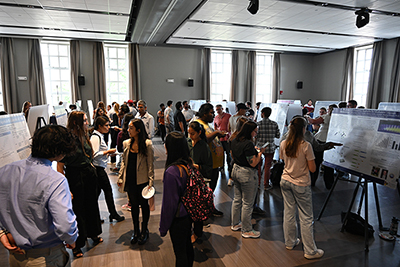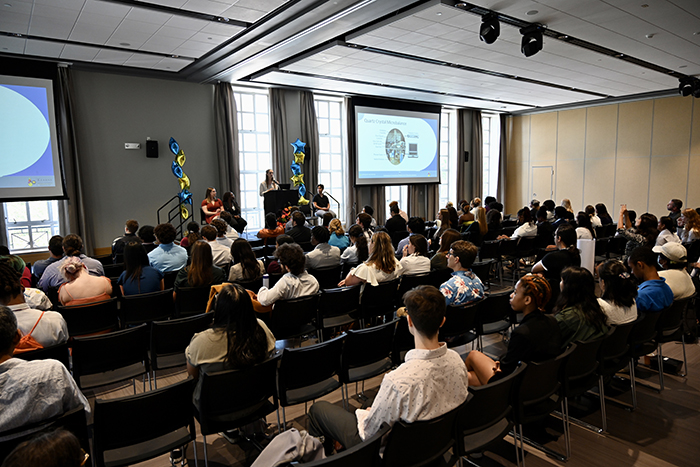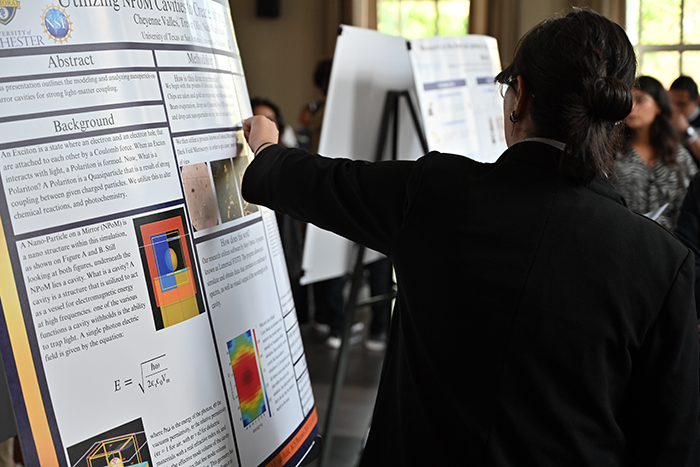Partnerships, New and Old, Fostered Through Summer Programs at The University of Rochester

Opportunities for research at the University of Rochester (UR) continue to get ‘Ever Better’ – that was particularly true this past summer when a new partnership between the University, North Carolina A&T State University (NCA&T) and the Thurgood Marshall College Fund, brought four students to campus to engage in summer research. Those four students joined dozens of other students on campus doing research in different summer programs, including the Research Experiences for Undergraduates (REU) programs and the Ronald E. McNair Post-Baccalaureate Achievement Program.
A New University Partnership on Display During the Summer Programs
The pilot program debuted this summer was called “Pedagogy and Practice of Racial Equity and Excellence,” and was funded through the Sloan Foundation. Dr. Beth Olivares, Associate Vice Provost for Academic Equity and Executive Director of the David T. Kearns Center says the first year of hosting undergraduates from NCA&T went well, with the four students engaging in research in chemistry, biology, optics, and computer science. Several aspects of their summer experience included opportunities to engage in professional development and social activities supported by the Kearns Center. “Having the four NCA&T students plugged into everything going on in the [Kearns] Center this summer, for example, gave them the opportunity to experience the vibrance and wide-ranging diversity of research at an R-1 university while still being supported by -and connected to- a small, dedicated community of professionals,” Olivares said.
That rang true for NCA&T student Taylor Franks, who says she had an amazing experience and learned a lot. “I learned things that I didn’t even think to ask. I feel like people here were very helpful.” Franks went on to say that being on campus added to the enjoyable experience. “I was excited to go to work, just to walk around and just immerse myself into a great culture.”
According to Olivares, the focus of the pilot program was to have the undergraduates from NCA&T participate in summer research at Rochester and apply to graduate programs in the fall, with the hope that they would apply and enroll in graduate studies here at the University. The pilot program is just one part of a multi-faceted partnership between the University of Rochester, the Thurgood Marshal College Fund and four Historically Black Colleges and Universities or HBCU’s including NCA&T. The partnership, which is in its early stages, is working to establish active collaborations between the U of R and partner schools. “Having the four students here from NCA&T, funded by Sloan, shows the magic of the partnership” Olivares says. “It connects the Thurgood Marshall College Fund directly with the Kearns Center and faculty in AS&E (Arts, Sciences & Engineering) departments, demonstrates external fiscal support and trust in the connections, and brought us together as colleagues in a tangible way. From my perspective, everyone benefits from this kind of arrangement.”
A portion of the Sloan Foundation funding also paid for training from the Association of College and University Educators or ACUE. The training was meant to help faculty mentors use inclusive teaching practices to support the program. Director of Diversity in STEM, Danielle Daniels says this training was helpful. “The training helped mentor faculty incorporate anti-racist and culturally responsive practices into the research experience. It helped faculty respond to the participants' unique perspectives and experiences and respond to their needs.”
Olivares says she is excited for the future, and eager to see how the partnership will grow. “The partnership gives us the ability to develop meaningful, research-driven connections with colleagues at HBCU’s.” Olivares say the vision for this partnership is to increase a new generation of PhD professionals, and eventually increase applications and admissions to UR doctoral programs by students at partner schools.
REU Programs Attracted More Than 40 Students from Other Institutions to U of R
Increasing a new generation of students going on to graduate school is also a goal of the REU programs. The University of Rochester is one of hundreds of REU sites across the country and welcomes students from other institutions to campus each year. The National Science Foundation (NSF) funds these internship-like programs which span the course of ten weeks and usually involves groups of 10, from diverse backgrounds, and different academic disciplines. These experiences allow students to work closely with faculty and other researchers, receive mentorship, and build their professional networks, according to the NSF. The opportunities are extremely competitive, with many REUs fielding hundreds of applications for less than a dozen slots.
This summer, 43 students participated in four different REUs at UR – in Chemistry, Data Science, Electrical and Computer Engineering, and Physics and Astronomy – and received the opportunity to explore research as a career. The students came from schools across the country; from Wellesley College to The University of North Carolina, Chapel Hill, from Brown University to Princeton University, from San Francisco State University to University of Texas at Dallas and from schools right down the road from UR, including RIT and Nazareth University. Student participants in these REUs not only got access to a top tier research opportunity which they may not have been able to get at their home institution, but they also earned stipends, and were provided on-campus housing, and a small campus meal voucher.
REU programs create an immersive environment for students, which can be a difference maker when it comes time to making decisions regarding graduate school and other post-baccalaureate professional endeavors, according to REU Coordinator for the Kearns Center, Samantha Branch. “Students mentioned that if they hadn’t already been seriously considering graduate programs prior to the REU, that they were now going to apply to PhD or Masters programs. Some students now aim to work in research either in academia or industry after graduate school.” REU programs are strongly encouraged for students who are looking to get into STEM fields after they complete their education. So not only are they beneficial academically, but they also help support students in a broader way, according to Branch.
Getting the chance to participate in these top tier research experiences will benefit more students next summer, after an announcement earlier this year revealed that the University of Rochester will host a fifth REU program in nanophotonics, quantum photonics and vision/biomedical optics. The new REU site at Rochester is supported by the NSF and the Semiconductor Research Corporation. The NSF hopes this REU will diversify the student body that is doing research and entering careers in photonics, as well as bring more awareness to photonics as a career.
The Kearns Center Coordinates Support for Summer Programs
From the end of May to the end of July, the research scholars in the three different programs were hard at work on campus, learning from their faculty mentors how to solve real world problems. Their summer experience came to an end with a conference style symposium hosted by the Kearns Center, a chance to showcase and discuss their research.
The Kearns Center not only hosts the symposium, but also coordinates these summer programs at Rochester, assisting student participants with their arrival, and settling in on campus. The center also teaches useful courses and coordinates social activities, to help bring together all the student researchers.
Olivares says providing this extra support can make all the difference for students’ success in the summer programs. “Students from all programs interact with each other both socially and professionally and build a cadre of friends and colleagues in their own fields as well as adjacent ones, so they have a strong, wide and deep network to turn to as they journey through the end of undergraduate and into graduate school and beyond.”
Summer Research Experiences Set Students Up for Success
The students who participated in the summer programs gained more than just a boost to their resume and a strong network; they gained insight into themselves which also meant learning that they belong. “The people I worked in the lab with were incredibly supportive and made me feel like I was an actual part of the team and not just someone who was there to be a burden,” said Kean University student Alejandro Chavez-Mayoral, who spent the summer in the Electrical and Computer Engineering REU. Chavez-Mayoral added that the best part of his experience was the relationships he was able to make with the other students in his cohort. “Instead of it feeling like we were forced to talk to each other, we all came together, and it felt like we were family. We would all cook and eat together, watch movies, go outside and play sports, or visit some interesting places in Rochester. We even made close friends with U of R alumni!” Chavez-Mayoral said.

Having a strong sense of community and belonging is such an important piece of the equation for students, according to Branch. “Having their thoughts and ideas respected by their colleagues and mentors can help [the students] combat imposter syndrome.” She says. This can be especially important for those who identify with groups that are underrepresented in STEM fields. And while marginalized groups broadly remain underrepresented in STEM, progress is being made. A report on diversity trends in STEM workforce and education published earlier this year by the NSF found “more women, as well as Black, Hispanic, American Indian, and Alaska Native people collectively, worked in STEM jobs over the past decade, diversifying that workforce, and are earning more degrees in science and engineering fields at all levels compared to previous years.”
“You cannot put a price tag on the experience you gain through summer research, especially here at the University of Rochester,” says Dr. Antonio Williams, Director for Graduate Diversity Initiatives, in Arts, Sciences & Engineering. “Our goal is to get students excited about research by having them learn to solve real-life problems in real labs. The support we provide the students, whether it is a personal statement for graduate school, GRE Prep, or social activities, is all aimed at helping students cultivate a sense of belonging within the research community while supporting them as they prepare for master’s and doctoral programs.” The REU experience can also indirectly act as a recruiting tool for the University of Rochester. With students seeing what the city of Rochester has to offer during the off-campus social activities that the Kearns Center hosts and getting connected with faculty in graduate programs. Williams says he has already met with a couple students who participated in this year’s summer program who have expressed interest in applying to graduate school here.

One of those is Nazareth University student Sophia Caruana. She participated in the Data Science REU and did her research on “continual learning in deep neural networks of audio-visual data.” She says her initial interest in graduate school at Rochester was one of the reasons she applied to the Data Science REU. Caruana says she learned a lot during the experience including what it means to be a student at a top tier research institution, and how to mentally prepare for research in graduate school. “The best part about doing research at Rochester was interacting and learning from the research community I came to be a part of. Everyone is committed to helping you be the best researcher you can be, students and professors alike.” Caruana said. “My own [faculty mentor], Dr. Christopher Kanan, was especially helpful in guiding me through the research process and giving me quality advice on graduate education. Not only did I learn a variety of computer science skills from his lab, like computer vision and multimodal machine learning, but I also gained a variety of different perspectives on what it means to be a researcher.” Caruana is set to graduate from Nazareth in 2024 and says one of the strongest aspects of the REU program is how it prepared her for graduate school, adding that she already has most of her application materials complete.
